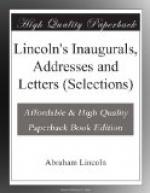The speeches delivered by Lincoln on the journey to Washington, in 1860, beginning with the exquisite Farewell Address at Springfield, include some of the best of his shorter addresses. The most interesting of these is the one delivered in Independence Hall.
The First Inaugural Address was not received at the time of its first publication in the newspapers, even at the North, with the general enthusiasm that we should now be inclined to assume; and in the South it was severely criticised for its alleged lack of force and definiteness. Its effect, however, upon the immense audience gathered in front of the Capitol seems to have been immediate. The document had been written with great care at Springfield, some changes being made after the arrival at Washington. The most important of these were the substitution for the original closing paragraph of the beautiful peroration suggested by Secretary Seward. In beauty of language and elevation of thought this first public utterance by President Lincoln may be compared to the great political utterances of Burke.
First among the little classics of the world stands the Gettysburg Address. At the time of its delivery it does not seem to have been generally accepted as a notable utterance. By many of the newspaper correspondents it was referred to as “remarks by the President,” and some of the papers contained no comment upon it. By others it was dismissed with a few words of mild praise. Even after the death of Lincoln there was no general agreement as to its supreme merits as a part of our national literature. Conflicting stories still pass current in books and articles on Lincoln about its composition, and original reception. An examination of the testimony shows that the following facts may be accepted as fairly proved. The greater part of the address was written in Washington after very careful preparation, and profound reflection. The address was read from Ms., but with some variations that apparently occurred to the speaker at the time of delivery. Mr. Everett did not clasp the President’s hand while he expressed a willingness to exchange his hundred pages for the twenty lines just read. It is uncertain whether Lincoln said at the time that the address did not “scour,” but if he did use such an expression it was not because of a consciousness of having failed to make adequate preparation for the occasion.
One of the best commentaries on the Second Inaugural Address appeared in an article in the London Spectator: “We cannot read it without a renewed conviction that it is the noblest political document known to history, and should have for the nation and the statesmen he left behind him something of a sacred and almost prophetic character.” Carl Schurz compared it to a sacred poem, and all discriminating readers agree in placing it by the side of the Gettysburg Address as an almost perfect specimen of pure English prose.




